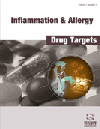-
s Editorial
- Source: Inflammation & Allergy-Drug Targets (Discontinued), Volume 10, Issue 1, Feb 2011, p. 1 - 1
-
- 01 Feb 2011
Abstract
Scientific publishing is, in some way a virtual market for the best ideas, the proof of principle and concepts, influenced not only by the scientific content, which should be transported within the scientific community, but also by many other factors, like allocation of money for research, like the impetus to publish novel and non-main stream conform ideas, and to gain power in science, either personally or institutionally. It is our job as a scientist and as Editor-in-Chief to raise awarness about the consequences of scientific, political and public interference in science in an accessibly way - and this issue is the fertile ground of the progress of a scientific journal. The ongoing effort to increase awareness of novel scientific findings worldwide and the scientific issues amongst scientists and non-scientists alike is essential to restore independent science to each and every one that follows. Due to the persistent and energetic engagement of all scientists, interested in the special publication organ: “Inflammation & Allergy - Drug Targets”, and due to the excellent editing work of the staff of Bentham Publishing House, I like to thank all of you doing this great job in the past. However, as Editor-in-Chief, I carry responsibility for the development of the journal in the near future. All of you know that scientific publishing is within a revolutionary stage. Both, in terms of quality and quantity, published data and approved patents in life science reflect the strength of science and biotechnology of a country. In a global world, the global leaders are on a transition and the “East” is now showing up a tough competition to “West” in terms of presenting pausible and novel data, in competing for publication space in highly ranked journals and in obtaining funds from global players of the pharmaceutical industry. Of course, within this highly competitive processes of i) asking new questions, of ii) validating the raised questions and of iii) painting a picture of reality, which might be materialized, either economic- and/or ethic-wise, under political or personally focused career pressure, scientists might pursue scientific research and presenting data with among other goals of attaining first knowledge - just by fabricate data. In the past, a substantial number of editors of prestigious journals are notified by reports that, e.g. university committees of research integrity have investigated allegations of falsified or fabricated published data. Scientific misconduct is a violation, and, for such a growing and now widely accepted journal within its scientific community, like “Inflammation & Allergy - Drug Targets”, this would be a deadly process; above all, as it is the goal and wish of the Editors, to attract manuscripts from those authors, who have submitted their papers to highly ranked journals, however rejected, but, not because of a mediocre scientific content, but of the limited space available within the journal. “Inflammation & Allergy - Drug Targets” wants also become a journal for those authors working in countries which improve the standards of scientific publishing by the help of the peers of the Editorial Board; it is the academic task of the peers of this journal to promote a manuscript scientifically to a higher grade; it is not acceptable that a manuscript will be declined for publication because of cultural reasons or scientific paradigms not compatible with Western views - at the very end, there is only one truth in nature. As Editor-in Chief, I like to thank all authors, peers and the member of the Editorial Board that they have a keen eye on the Swedish Definition of scientific misconduct: “Intentional distortion of the research process by fabrication of data, text, hypothesis, or methods from another researcher's manuscript form or publication; or distortion of the research process in other ways”. It is with pleasure that Armen Yuri Gasparyan, MD, PhD, Associate Professor of Medicine, Dudley Group of Hospitals, UK, will join in 2011 the journal as Deputy Editor. His broad experience as a Member of the World Association of Medical Editors and as a Member of the European Association of Science Editors will further substantiate the journal´s maxim: (1) Rapid decision about the fate of a submitted manuscript, (2) generally within 21 days, (3) timely publishing and (4) to get the best expertise in basic, translational and personalized medicine for the benefit of the authors submitting their manuscripts to IA-DT. I like to end in reminding all members of the Editorial Board, that IA-DT is a highly recognized journal in the specialized field of inflammation, allergy, drug targeting and development. We approved the membership in IA-DT by asking the Editorial Members to show up with their manuscripts, whenever appropriate, and to respect and honor the results of their colleagues by citation of relevant articles. For 2011, as Editor-in-Chief, I like to thank and to extend the best wishes to all supporters of IA-DT; and that IA-DT might keep on going for the success of publishing data, which might help individuals -soon or later - for a better and peaceful life and to increase the awarness of the public sector about the mandatory importance of life science - now, and in the future.


